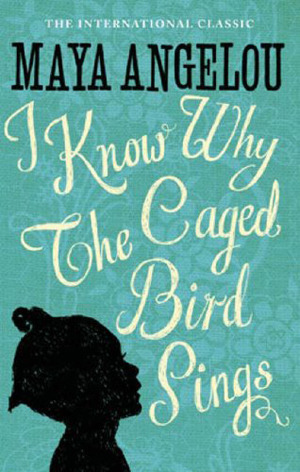This is probably one of the more difficult posts in this blog, and I did play with the idea of not writing about this book at all. But, the use of this blog is primarily for putting down my personal thoughts and feelings about the books I read - and while I always express my own view on issues, I try to play the devil's advocate as well and try to see the other side of the matter.
With this in mind, I also would like to say how far I am from the state of things described in this book: I'm caucasian, European, middle-class, pretty well educated, never having been excluded from anything because of any restriction, never having witnessed slavery, segregation, racism (although one might argue that nowadays we witness a new kind of racism all over the planet...). In any case, I know why the caged bird sings had been on my list for quite some time and I looked forward to reading it:
This is the first of the "autobiographical"
books Angelou wrote and perhaps the most known one.
In it, she describes her life as a child until she
becomes an adult - and a mother. My
mistake from the beginning was that I expected the child Maya to be the grown
woman Angelou I've come to read about.
I would never have imagined that wise people often do not
start out like this - it may be the
facts and trials of life that push them towards a later wisdom and that it is
their experience with the "wrong side" and the "wrong people"
that shine the guiding light towards an inner strength.
Young Maya is black girl living in the American South, at
a time when segregation is the norm. She
has no contact with "whitefolksville", but she is fully aware what
happens when one of her folks "messes up with a white lady". While she does not seem to fully understand
what is happening, there is one person (of the few in her surroundings, in my
opinion) that shows signs of a role model: her grandmother, Momma. Maya's parents have separated and thus Maya
and her brother Bailey are being brought up by a very strict, Bible-driven
shop-owner. I would have assumed (after
writing this post, I've come to realise how much my text oozes with assumptions
- totally out of place) that anything / anyone that drags me out of the
everyday resignation would be well-received.
And that's what Maya does - in the beginning. She talks of her encounters with Mrs. Bertha
Flowers, the aristocrat of the Black Stamps:
she is the one who introduces Maya to some of the best wisdoms in the book:
Words mean more than what is set down on paper. It takes the human voice to infuse them with
the shades of deeper meaning
Be intolerant of ignorance but understanding of illiteracy
What a wonderful thing to be able to distinguish between
the two and to understand that formal education, the "good on paper",
not necessarily the true value of a person is.
But then Maya's parents come back into the picture, and
from the path to wisdom Maya is thrown into the world of crime, deceit and
rape. This is one of the parts in the
book where I really struggle to understand Maya's reaction. I can only imagine the shock, the distrust,
the shame and I try to find reason in the behaviour by both Maya and her
mother. I feel no connection to either party and I'm just left feeling sad.
The book is full of stories that are permeated with the
hopelessness, the anger, the agony that go through Maya and the people around
her. As Angelou rightly mentions
"the needs of a society determine its ethics" -- law violations,
rape, deceit are weighted on a different set of scales. And it is thus that Maya continues her rough
journey through life. But what I fail to
see is a strong Maya, who can rise above her tragedy and be a glorious example
of triumph against the odds. What I see
is a child, and later on a teenager, who treads on the same path as her
forefathers have...
From her later years in life, I know that Angelou a voice
was for education and equality and I've been impressed by her insightful speeches. What I gathered from this book, however, was
that it is much too easy to fall victim of all of life's atrocities. To give in to "fate and the Furies" and confirm failure to one's worst critics.
The end of the book, especially, left me perplexed and
I'm not sure I want to go into detail.
It deals with the background story to Maya getting pregnant and ends
shortly after she gives birth. The
questions she has in her mind as a 16-year old are all valid still in our
days. But her reaction? I found it rather dangerous. The reaction of her mother? Shocking. The idea of an "immaculate
pregnancy"? Astonishing...

This but be a really great book for a book club discussion. You made me curious about the ending and I wish we could actually discuss it more in person!
ReplyDeleteI agree - I'll IM you
Delete